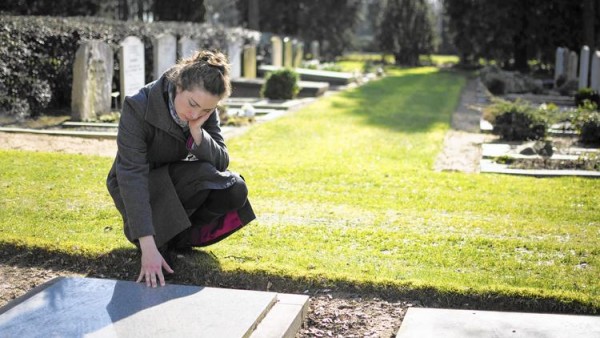By Richard Asa

When you’re young, the distinct pain of grief may be felt with the loss of a beloved pet. Sometimes years go by, though, before a family member or close friend dies.
Losing someone close to you for the first time is overwhelming. The grief is an unexpected cascade of treasured memories intertwined with feelings of incomplete, unexpressed emotions. In “On Death and Dying,” author Elizabeth Kubler-Ross described the five stages of grief: denial, anger, bargaining, depression and acceptance.
Denial is the first stage that will hit you when someone you love dies. It opens the door to what is to come.
Kubler-Ross and David Kessler, in the book’s new edition “On Grief and Grieving,” explain that denial comes first to help you survive the loss. During this stage, “the world becomes meaningless and overwhelming. Life makes no sense. We are in a state of shock and denial. … We go numb.” Really, we just want to run away.
Denial must be met head on though, because it starts the grieving and healing process.
“Do your best to remain self-aware in the face of the emotions that will surge,” says Virginia A. Simpson, a Sacramento, Calif., bereavement care specialist and author of “The Space Between,” a book about caring for her dying mother. “Acknowledge that thoughts such as ‘I can’t handle this’ or ‘I’m not strong enough’ are just a story you are telling yourself.”
Expressing feelings, negative and positive, is important. “You can’t avoid the enormity of the situation,” says Judy Rosenberg, a Los Angeles-based clinical psychologist. “Along with the death of a person comes the death of precious memories and feeling of incomplete, unexpressed emotions. … Expression allows you to heal and move on.”
Spiritual counselor Audrey Hope said she walked in circles at her office for hours after receiving news of her sister’s sudden death. She then expressed her rage and grief by lying on a table and screaming off and on for three hours, she said.
If you are able, being at the bedside of a dying friend or family member can help blunt the pain of denial. Although the paradox of denial is that it can keep you from being there, being part of the dying process can help you through the other stages and lead you toward acceptance.
“Because most people are intimidated by the dying process, they tend to leave the bedside before they have said their final goodbyes,” Rosenberg said. “When death is not appropriately grieved, you bear the burden of feeling incomplete. This sense of incompletion can show up as guilt, nightmares and a general feeling of suppressed emotions.”
The unexpected loss of someone you love calls for true courage. Chicago therapist David Klow believes that while many people might shrink from the unexpected experience, they would benefit by remaining open to it and “leaning into the feelings.”
“Rather than fighting through the feelings, it helps to stay with them and let the feelings guide how you might say goodbye,” he said. “Most people worry they will become too overwhelmed by emotions (but) being able to feel what we are going through in the moment actually allows for a healthier grieving process.”
To help prepare them for the loss of a loved one later, kids can benefit from learning about loss not related to death early on. Learning how to deal with leaving one school for another, losing a friend who moves away or breaking an object that had special meaning can help create understanding of grief.
“Those experiences help us learn to cope with a loss,” says Kriss Kevorkian, a Los Angeles-area thanatologist, a person who studies death and dying. “When losing a loved one for the first time, the best thing to do is ask (yourself) how you coped with other losses in your life.”
“In our society, we’re often told to ‘get over it,’ which is just about the worst advice ever,” she said. “Sit with your grief, find the meaning in it through appreciating that fact that you have loved ones that you care for.”
There’s no way to avoid grieving, Kevorkian says. It will come no matter how much you try to resist. “Allow it to unfold,” she says. “Grief … teaches us to appreciate life and those we love. Instead of pushing it aside, embrace it and learn to truly be grateful for every day.”
Simpson, the bereavement care specialist, offers this advice when you are at the bedside of a loved one who is dying:
1. Consider that being present at the end of someone’s life is a sacred honor, a privilege and a gift.
2. Accept that you may be scared and that it’s OK.
3. To alleviate your own fear, focus your attention on the person you love. Touch them, speak to them, sing to them, thank them.
4. Don’t worry if you cry.
5. Don’t be concerned about knowing the right thing to do. There is no single right thing. Just show up, pay attention, tell the truth and don’t be attached to the outcome.
Complete Article HERE!
